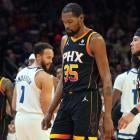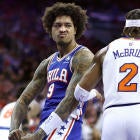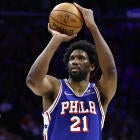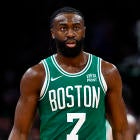The Utah Jazz are, in terms of depth and well-rounded talent, probably a top 5 team in NBA heading into the 2016-17 season. That probably sounds crazy to a lot of people, but it's true.
The question is whether their record this coming season, and potential playoff seed, will ultimately reflect that talent. You have to assume Utah will be in the postseason this year. They weren't this good last season and still only missed the playoffs by two games, and statistically they performed much better than their 40-42 record.
In fact, despite injuries to Derrick Favors (20 games), Rudy Gobert (21 games), Alec Burks (51 games), and Dante Exum (the entire season), the point differential of the Jazz last season projected them to finish with a 46-36 record. That would've made them the No. 5 seed in the West, which seems like a reasonable, if even a little conservative, projection for this year.
Aside from the injuries, Utah's biggest problem last season was that it went just 10-17 in games decided by five points or less. They have to get better in the close games, and given that they went out an acquired three solid veterans who can win them those crucial late possessions, there is reason to believe that could happen.
After moving their No. 12 pick in the draft in a three-team deal that netted them George Hill from Indiana, the Jazz signed Joe Johnson to a two-year, $22 million deal and got Boris Diaw for essentially nothing when the Spurs needed to clear room to sign Pau Gasol. Throw in a healthy Exum and Burks and you now run 11 or 12 deep on this roster, and actually have more of a problem finding minutes for all of the talent at Quin Snyder's disposal.
And the best part is, these were all calculated moves. They weren't panic moves by a team that just missed the playoffs. There is a real plan in place here, and you can see it coming to life.
"Just in the playoffs, just out of the playoffs -- I don't think it would've changed this offseason much," Lindsey said during Jazz media day. "We wanted to add experience, size, skill, physicality, shooting, passing, and we were able to do so. I think it's very complementary to our younger veterans who have been here a while. I think it was a natural step. I don't think we were skipping steps by any means."
Now the Jazz run out one of the most complete teams in the league. As we were trying to figure out just how good each team was with their starters and their bench units, CBSSports.com ranked the Jazz the 5th best starting lineup in the NBA and the best bench in the league. Their over/under win total for this coming season is at 47.5 and this easily feels like a 50-win team. But we've been through plenty of teams before that we went into the season feeling like they would make the playoffs, seeing them play relatively well, and still miss the postseason.
That is Utah's challenge. To control, and ultimately live up to, the hype.
Lindsey, Snyder, and various incumbent Jazz players were careful in the way they addressed the media in terms of expectations. Gordon Hayward was quick to mention the group hasn't accomplished anything yet. There weren't any definitive exclamations of playoffs or bust. There wasn't a win total being pegged as a goal. The message was the clichéd response of getting better every day and not putting a ceiling on what they can accomplish. But new starting point guard George Hill wouldn't play that game.
"Our goal is to make the playoffs," Hill said. "Anything less is not a good season for us."

It makes sense for Hill to have that attitude and not hide from putting those expectations on his new team. It's a young team that has to figure out not just winning but winning when you're expected to win. He's played for the Spurs and the Pacers in his eight seasons and only missed the playoffs one time -- the year Paul George broke his leg and missed all but six games. Of course, simply making the playoffs is going to be the lowest measurement of success for Utah.
The Jazz's familiarity with Hill comes from his time with the Spurs organization. Lindsey was the assistant general manager for the Spurs from 2007-2012 and a part of the group who decided to both draft Hill with the 26th pick in 2008, and then trade him to the Indiana Pacers in 2011 to acquire Kawhi Leonard. Snyder is also another product of the Spurs system, having led their successful D-League team, the Austin Toros, around the time Hill was in San Antonio.
"I think there's a comfort level you have with some of the training guys have received [with the Spurs]," Snyder explained. "George's role here will be slightly different than it was in San Antonio. Boris's maybe similar in some respects so I think there's a comfort level in who they are as players and how they fit with our group."
Snyder reached out to Gregg Popovich to get opinions on Hill -- and Diaw too -- when making decisions to acquire them and then after on how to make it all work together. What he received was a resounding endorsement of both players and the impact they could have on the team culture and the younger players they mentor by both passing on knowledge and leading by example.
But how do you build that ideal team culture and how do you manage the expectation of being one of the better teams -- whether that's coming from outside projections or internal goals?
"The fundamental approach that you have toward playing the game doesn't change," Snyder said. "If that enthusiasm, comfort, fear -- whatever emotional baggage you bring into a season that impacts your emotional state -- that has to be supplanted by hunger, hard work, unselfishness, passion, all those things. I think if your focus is there or if you can redirect it there, that's everyone's job. I've got to do the same thing."
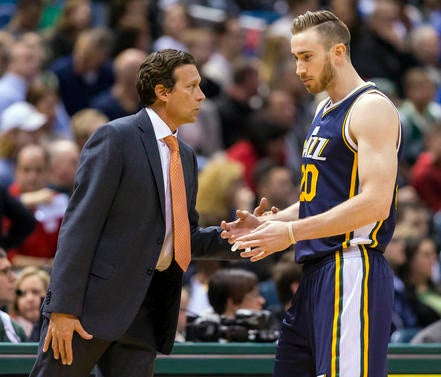
This is still a very young team in terms of experience. Four of their 1o rotation players have three seasons or less of experience. Favors, Hayward and Burks all have less than six seasons of experience, and just four career playoff games each. Hill, Diaw and Johnson will be the guys teaching them how to channel that youthful exuberance with the understanding of a veteran's approach.
"Sometimes that enthusiasm is really good," Snyder said. "Often times it's great. But that doesn't necessarily mean it's channeled the right way. You've heard people be too excited or too emotional. What that means to me is you just lost a little bit of focus on the things you need to do to be successful. We know what those things are and we just have to hang on to them and work toward them."
Last season, that lack of experience coupled with some overzealous enthusiasm led the Jazz -- who hang their hats on being a great defensive team -- to be the third worst defense in clutch situations. In games that were within five points in the final five minutes of the fourth quarter or overtime, the Jazz had a 14-28 record. That's brutal for a young team hoping to make the postseason and getting edged out by a Houston Rockets team that didn't really want to play together. The Jazz once again showed their potential but couldn't turn it into something tangible.
"I definitely can see the potential that everybody has," Diaw said about his new teammates, "but then you've got to do it on the court. You have to transform that potential in a culture of winning. I've been on different teams. Some teams that have won a lot of games during the season and some teams that have not. You see that the culture is something being built but once it's there it's something you can sustain at a high level. I wouldn't say it's pretty easy but the toughest part is to build it up. Once you get that culture, it's easier [to sustain it]."
The foundation of it all seems sound. Good young players now mixed with veterans to show them the path to success. A smart coach with the full support of a versatile assistant and development staff. A general manager who has crafted a team seemingly too deep and talented to fail. So many teams have futilely tried to replicate what the Spurs have built over the last two decades, while the Jazz have taken the patient approach in continuing to sculpt that culture they've been a part of, even when failures and setbacks jump in their path.
Now they just have to break through with their latest improvements, which establish them not as the challenger to the Golden State Warriors in the West, but certainly a legitimate player for home-court advantage in the first round and perhaps, if things break right, a conference finals candidate.
"There are fundamental pillars behind improvement," Lindsey said. "The glass ceilings get thicker as you get better but the core characteristics of what you have to do to improve often remain the same outside of changing personnel. That's working hard, having a humble nature, the group coming together and giving of itself. Certainly, we're built defensively. So can we move from 12th two years ago to seventh to something that's more unique and can we sustain that?
"We had that stretch in 2015 that was quite unique and everybody's written about it and appropriately so. Can you do that over multiple seasons? Time will tell."
For the Jazz, that time is now.















